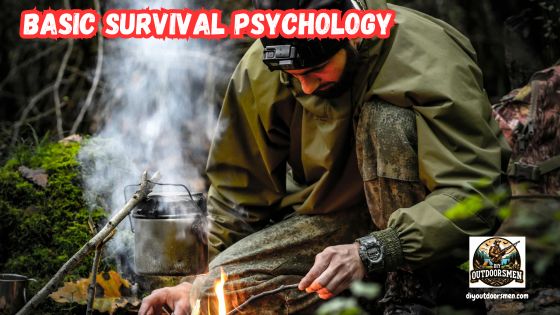Contents
- 1 Fundamental Concepts of Survival Psychology
- 2 The Fight or Flight Response
- 3 Recognition of the Stress Response
- 4 Psychological Factors Influencing Survival Instinct
- 5 Social Dynamics in Survival Behavior
- 6 A Next Stage View of Survival Instinct
- 7 The Interplay Between Survival Instinct and Psychopathology
- 8 Advanced Reflections on Survival Strategies
- 9 Essential Factors for Applying Survival Psychology in Real Life
- 10 Frequently Asked Questions
- 11 Further Considerations and Practical Applications
- 12 Wrapping up Insights
I have spent a considerable amount of time studying the human mind, and I find that understanding the basics of survival psychology can change the way we view our own behaviors and decisions.
Survival psychology is about recognizing the innate drive that every human possesses to protect themselves from harm and to find ways to get through intense situations. In this article, I share insights that explain how this instinct works and why it remains very important in today’s world.
QUICK LOOK: Survival Psychology
Survival psychology refers to the study and understanding of the natural instincts and emotions that drive us to protect ourselves in dangerous situations. It covers both our natural biological responses as well as the mental strategies we use under stress. Survival responses are not just physiological reactions; they are also deeply influenced by psychological factors.
- One of the most well-known reactions in survival psychology is the fight or flight response. It as a quick and automatic system that prepares individuals to either face a threat head-on or run away to safety. This reaction is triggered without conscious thought, involving both the mind and the body in rapid coordination.
- In addition to the fight or flight mechanism, there is a broader stress response that activates when we notice signs of danger. This response is not solely about immediate threats but also about handling prolonged pressure or anxiety.
- While survival instincts are very important for protecting us, the disruption in these natural responses can lead to mental health issues. When the mechanisms for self-preservation are overwhelmed or suppressed for long periods, individuals might show signs of psychopathology.
- Understanding basic survival psychology provides you with knowledge that applies not only to extreme situations but also to everyday challenges. Recognizing the natural instincts that drive our actions helps in managing reactions, reducing stress, and improving decision-making under pressure.
Fundamental Concepts of Survival Psychology
Survival psychology is the study of the natural behaviors and responses humans exhibit when confronted with threats. At its core, survival instinct refers to a biological drive aimed at self-preservation.
I learned that this drive is not only about keeping oneself safe but also about protecting those we care about. It reminds us that many of our actions originate from a deep-rooted need to avoid danger.
This instinct is evident in both humans and animals. It emerges during situations that require immediate decision-making and comes with a host of physiological changes that prepare the body for action.
The Fight or Flight Response
One of the most well-known reactions in survival psychology is the fight or flight response. When I reflect on this reaction, I see it as a quick and automatic system that prepares individuals to either face a threat head on or run away to safety. This reaction is triggered without conscious thought, involving both the mind and the body in rapid coordination.
The following points highlight the key elements of the fight or flight response:
- Physiological Activation: The moment a threat is perceived, the brain signals for the release of stress hormones such as adrenaline. This prepares the muscles and sharpens the senses.
- Heightened Alertness: In those moments, awareness increases dramatically. Every detail in the environment becomes significant, which helps in quickly assessing the situation.
- Energy Surge: The sudden burst of energy gives the body the extra strength needed to either confront the danger or escape from it.
- Immediate Decision-Making: This response triggers rapid decisions without the need for long deliberations, which can be critical in emergency situations.
Understanding these factors has helped me appreciate how our bodies are designed to respond during crises. It also sheds light on why sometimes our decisions in dangerous situations may seem impulsive, yet they are part of an evolved process geared for survival.
Recognition of the Stress Response
In addition to the fight or flight mechanism, there is a broader stress response that activates when we notice signs of danger. I found that this response is not solely about immediate threats but also about handling prolonged pressure or anxiety.
This stress response has several stages:
- Alarm Stage: The body recognizes the existence of a threat and a surge of hormones begins to circulate.
- Resistance Stage: The body attempts to adapt to or counteract the stress. During this stage, energy is directed to essential processes while non-critical ones are temporarily put on hold.
- Exhaustion Stage: If the stress endures for too long, the body’s resources may become depleted, which can lead to physical and mental breakdown.
This pattern helps explain why long-duration stress without a clear exit strategy can have serious consequences on health. Even though I find it fascinating that the body is wired to protect itself, it also warns me to manage stressful situations proactively.
Psychological Factors Influencing Survival Instinct
Survival responses are not just physiological reactions; they are also deeply influenced by psychological factors. I have noticed that individual perceptions of risk and experiences with threats can vary the intensity of our responses.
Some psychological factors include:
- Fear: The feeling of fear alerts us to danger and motivates rapid action. However, it can also be overwhelming if not managed properly.
- Anxiety: A general sense of unease can affect decision-making processes. It might cause hesitation or, in some situations, help maintain caution.
- Decision-Making Under Pressure: Personal experience and training can influence how one decides to react. I have seen that practiced individuals might override intense emotions with learned responses during dangerous events.
These factors are important because they demonstrate that survival is as much about mental preparedness as it is about physical readiness. Understanding and managing these elements has helped me find a balance between instinct and reason.
Social Dynamics in Survival Behavior
Humans are social creatures, and I have observed that our survival instinct extends beyond individual actions to include group dynamics. Being part of a community makes it easier to manage threats and cope with crises.
Some aspects of social influence on survival include:
- Group Cooperation: In dangerous situations, people often work together to solve problems. Team efforts can lead to more effective ways to avoid or tone down threats.
- Shared Knowledge: I have seen that learning from past experiences shared by others can improve our own responses in critical scenarios. This can include advice about safety practices or warning signs.
- Collective Decision-Making: When people combine their perspectives, it often leads to solutions that benefit everyone. Collective keeping an eye out can improve the overall safety of all involved.
Recognizing this social aspect of survival makes me appreciate that sometimes the best way to stay safe is by relying on community support and shared knowledge. It also reminds us that survival is often a collective effort rather than purely an individual pursuit.
A Next Stage View of Survival Instinct
Survival psychology can be understood through the lens of evolution. I learned that the behaviors associated with self-preservation have been naturally selected over countless generations. These behaviors, including the fight or flight response, have enabled species to adapt and thrive in changing environments.
This evolutionary adaptation has several implications:
- Adaptive Behaviors: Natural selection has favored individuals who can respond quickly to dangerous stimuli. Over time, these responses have become hardwired in our biology.
- Reproductive Success: By ensuring survival during critical situations, these instincts have directly contributed to successful reproduction and the continuation of our species.
- Cultural Transmission: Experiences that prompt survival instincts are shared and passed down through generations. I have seen that survival techniques are often taught as cultural lessons, reinforcing the importance of these behaviors.
This perspective helps me see that survival psychology is not a modern invention. Instead, it is a fundamental part of who we are and explains why community bonds and personal resilience have developed over time.
The Interplay Between Survival Instinct and Psychopathology
While survival instincts are very important for protecting us, I also observe that disruption in these natural responses can lead to mental health issues. When the mechanisms for self-preservation are overwhelmed or suppressed for long periods, individuals might show signs of psychopathology.
Some issues that arise include:
- Chronic Stress: Prolonged activation of the stress response without adequate recovery can lead to anxiety disorders and depression. This is particularly noticeable in situations of ongoing threat or insecurity.
- Post-Traumatic Stress Disorder (PTSD): When traumatic experiences overwhelm the usual survival response, the resulting stress can persist long after the event. I have seen that PTSD can alter normal functioning and lead to chronic health issues.
- Ineffective Coping Strategies: Sometimes, individuals develop behaviors that actually hinder survival strategies. Overcoming these patterns often requires professional help and personal determination.
Understanding these negative outcomes helps me recognize the importance of maintaining a balance. Effective stress management plays a key role in ensuring that the survival instinct does not inadvertently cause harm over time.
Advanced Reflections on Survival Strategies
When I consider advanced survival strategies, I often reflect on how the basic principles of survival psychology are applied in more complex scenarios. Here, I discuss some refined ideas and techniques that people may adopt to improve their overall response to stress and danger.
Stepping up Environmental Awareness: In situations where danger might be present, a heightened state of awareness can prove valuable. I have noticed that training in environmental scanning and situational awareness can help individuals spot potential threats early on. This can involve regularly practicing mindfulness techniques or engaging in activities that require careful observation of the surroundings.
Building Emotional Resilience: Resistance to stress is not just a fixed trait; it develops over time through experiences and deliberate practice. I have found that learning strategies for emotional regulation, such as breathing exercises or structured problem-solving, allows one to maintain clearer thinking during a crisis.
Strengthening Group Bonds: Group training sessions or community workshops on safety measures can improve collective preparedness. By sharing knowledge and replicating effective safety protocols, groups can form a strong support network that reinforces survival instincts on both an individual level and as a community.
These advanced strategies demonstrate that survival psychology is not static. While the basic reflexes of fight or flight remain unchanged, the methods for managing our responses can be honed to suit modern challenges. They encourage me to continuously update my own strategies for handling stress and potential threats in everyday life.
Essential Factors for Applying Survival Psychology in Real Life
Putting theory into practice often involves identifying the most important factors that can positively influence our reactions in dangerous scenarios. I have learned that when applying survival psychology, there are several elements that people should focus on to better prepare themselves.
Some of these key factors include:
- Self-Awareness: Recognizing your own responses in stressful situations is very helpful. This awareness can guide you toward more effective coping strategies.
- Knowledge of Basic Responses: Understanding the science behind the fight or flight response leads to better self-management during real threats. Knowing when your mind is getting ready for danger enables you to take appropriate action.
- Practice and Training: Just like any skill, fine-tuning your survival response requires practice. I have found that simulation exercises or real-world role-playing scenarios can increase one’s ability to stay calm and think quickly.
- Access to Resources: Keeping informed about survival techniques, safety protocols, and even first aid can prepare you to handle emergencies more effectively. Resources—whether in the form of books, courses, or community group exercises—offer practical tips to safeguard yourself.
This practical advice has guided me in planning for emergencies and adapting survival strategies as situations evolve. I consider these factors as practical tools that reinforce our natural responses.
Frequently Asked Questions
Below, I address some common questions that arise when exploring the field of survival psychology:
What does survival psychology really mean?
Survival psychology refers to the study and understanding of the natural instincts and emotions that drive us to protect ourselves in dangerous situations. It covers both our natural biological responses as well as the mental strategies we use under stress.
How does the fight or flight response work in everyday scenarios?
The fight or flight response is activated when the brain senses a threat, even if it is not life-threatening. The body prepares itself by releasing hormones like adrenaline, which helps increase alertness and physical readiness. This process helps us react quickly whether we choose to confront the challenge or remove ourselves from the situation.
Can understanding survival psychology help manage stress in normal life?
Yes, awareness of how the survival instinct works can help manage everyday stress by encouraging methods to regulate our emotions and responses. Learning to identify triggers and practicing mental exercises can gradually help in reducing anxiety during stressful situations.
Absolutely. I have seen that social dynamics and cultural teachings often provide individuals with guidelines on how to react in danger. Shared experiences and communal support often improve the overall effectiveness of survival strategies.
Further Considerations and Practical Applications
In addition to the concepts already discussed, there is a broad range of practical applications that can make a real difference in everyday life. I have spent many hours reading and practicing various techniques that not only prepare you for emergencies but also improve general well-being.
One effective approach is to blend traditional survival skills with modern methodologies. For instance, pairing basic first aid training with recent technological advances, such as smartphone safety apps and online emergency communication channels, has proven to be a major asset.
Another aspect worth considering is the importance of mental rehearsal. Regularly picturing how you would react in a crisis can build confidence and improve your response time when it really matters.
This isn’t just theoretical thinking—it has practical benefits. I have often practiced scenarios with friends and family, focusing on different types of emergency situations. This exercise serves to reinforce your natural instincts and helps you adapt more quickly under stress.
Additionally, community-based exercises are invaluable. When groups come together to simulate emergency responses, each member learns from the other. Sharing experiences, discussing what worked and what didn’t, and revisiting strategies builds a robust framework for collectively handling danger. It instills a sense of preparedness and reassurance that you are not alone during critical times.
Finally, continuous learning is essential. The field of survival psychology and emergency preparedness is always evolving as new research and technology emerge. Attending workshops, following experts in the field, and reading updated guidelines are all ways to keep your knowledge fresh and effective. In my opinion, this proactive approach is what turns basic survival instincts into a lifelong advantage.
Wrapping up Insights
Understanding basic survival psychology has provided me with knowledge that applies not only to extreme situations but also to everyday challenges. Recognizing the natural instincts that drive our actions helps in managing reactions, reducing stress, and improving decision-making under pressure. Awareness of both the physiological and psychological aspects lets us see a more rounded perspective on personal safety.
I encourage anyone interested in self-improvement and personal safety to study these concepts further. Whether it is through reading more on the topic, attending workshops, or even discussing these ideas with peers, embracing survival psychology can lead to more informed, calm, and resilient behavior in the face of adversity.
By understanding the natural reflexes that govern our behavior, including the fight or flight response and the ways our minds process fear and stress, we learn a great deal about our inner workings. In moments of crisis, this knowledge serves as a useful guide in making timely decisions that can have lasting benefits.
I believe that an informed approach to survival psychology not only enriches personal growth but also improves group safety. In communities where people share knowledge and practice together, there is a stronger ability to handle unforeseen challenges, ensuring that everyone benefits from improved preparedness and resilience.
The balance between instinctive reactions and thoughtful responses is delicate. With continued learning and practice, the insights derived from survival psychology help me maintain a clear and focused mind even during difficult times. This balanced approach is something I strive to achieve in my daily life.
Embracing the fundamentals of survival psychology provides a pathway to better overall mental well-being. It reminds us that while our physiological responses are automatic, our mental responses can be trained and refined. This ongoing personal effort is a practical application of survival psychology that leads to more effective management of various life challenges.
My adventure with survival psychology continues, and I am convinced that there is always more to learn. Each new insight reinforces the importance of self-awareness, preparation, and community.
I hope that by sharing these reflections, others are encouraged to explore the subject, develop their own survival strategies, and ultimately feel more secure in both extraordinary and everyday circumstances.
Check Out Our Latest Articles:
- How To Track Wild Hogs DIY Tips And Techniques

- Bow Vs. Crossbow Hunting: What You Need To Know

- Understanding Deer Behavior To Improve Your Hunt

- Complete Guide On Tracking Game Animals

- DIY 4-Step Guide To Field Dressing And Quartering A Deer

- Night Vision Binoculars For Nocturnal Hunting

As always, stay safe, enjoy the journey and please try to leave it cleaner than you found it. If you have any comments, questions, ideas, or suggestions please leave them in the comment section below and I’ll get back to you ASAP. You can follow us on YouTube: Man Art Creations for videos of our DIY Adventures.
P.S. – Thanks so much for checking out our blog we really appreciate it. Just so you know, we may receive a commission if you click on some of the links that appear on our site. This helps us keep our content free and up-to-date for everyone. We appreciate your support!



